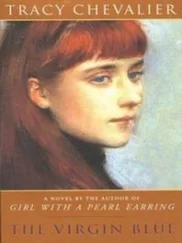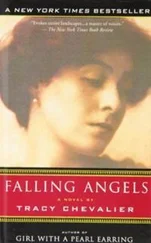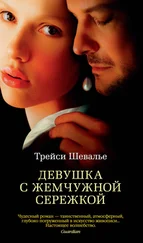We didnt lose any children last year. Thats somethin.
We lost nine trees.
I begun to laugh. Thats what this is about? Those goddamned trees? Five of our children died in this swamp and you want to go back because of trees?
James gritted his teeth so his jaw flexed and I felt the thrill I got when he was angry. Are we goin to fight right here on the road with people all around? I thought. Cause there were people ahead of us and behind us, and they would all get to see the Goodenoughs go at each other. If I was lucky Id give him a buckeye he could show off in Perrysburg.
But he didnt hit me. He surprised me again. This is a hard life to be passing on to our children, he said. I will feel guilty about that all my life, that we could have made it easier for them by staying in Connecticut. Then there wouldnt have been so many died, and so much death and hard work in their futures.
Theyll be all right, I said. Five children. That aint so bad. Sides, we got nothin back east. Your familys got no land for you.
I was surprisin myself by defendin us stayin in the Black Swamp. So many times over the years Id wished we could load the wagon and head back. But too much time had gone by, and when I thought about Connecticut it didnt make me smile. Instead I remembered how the wives all hated me. I could even admit now that Charlie Goodenough had probably been relieved to see the back of me. There was nothing to return for. Besides, we had five children buried in the swamp. We couldnt leave em.
Sadie, James said, that swamp is defeating me. I cant even grow fifty apple trees.
Numbers again. Dont worry bout that goddamn number, I said. Nobodys countin but you.

Perrysburg always made James feel a little better and then a little worse. Seeing the small collection of rough buildings after miles of trees and marsh reeds made his heart beat faster. Here was smoke from chimneys. Here were right angles and pine boards planed at a mill. Here was whitewash. Here were curtains in windows, and windowpanes rather than paper greased with bear fat. Here were planks to walk on over mud, hitching posts, the sound of laughter, even the tinkle of a piano. Here were women wearing brightly colored hats and dresses with hems that weren’t muddy. Here was civilization that did not rely on Goodenough sweat to make it happen.
Very soon he felt worse, though. For all the hardships of the swamp, there was a purity to it that Perrysburg lacked, or had destroyed. Buildings had been raised with no thought to the surroundings. Bits of wood had been left where they fell-splinters from planks, ends hacked off and strewn about, stumps half-chopped and then abandoned. Piles of earth left from excavated cold cellars had been rained and snowed on so that they solidified into ugly miniature mountains. Here and there were smoldering piles of leaves and rags. The outhouses stank of shit. No one cleared up the horse dung from the street. The planks outside the saloons were slick with spit and piss and puke. When anticipating a trip to Perrysburg, James always managed to forget about this aspect of the town. Now as he looked about him from the safety of the wagon seat, he had a sudden desire to be back on the farm, in the orchard, where the apple trees were blooming. It was the most beautiful time of the year there and he was missing it to come and be among people and their dirt.
The Goodenoughs scattered the moment James pulled up: Sadie to look over the merchandise in Fuller’s General Store, Nathan and Robert to trade their squirrel tails, Sal to look for other girls. James would ride on to the blacksmith to drop off the plow blade, then bring his own furs to the trading post. He reminded Sadie that they would not have much to spend. She gave him a look. “Got to get flour and thread and nails and sugar. Fabric for new shirts for Caleb-he’s grown out of everything we got. Shoes need mending. We need seeds.”
“No ribbons, that’s what I meant,” James said. “Brown sugar, not white. And leave the shoes-we won’t need ’em for the summer. We can get ’em fixed in the fall.”
Sadie snorted and disappeared inside. Now that he had forbidden ribbons, she would probably buy some.
He left the plow blade with the blacksmith, frowning at the cost, and arranged to pick it up the next day. That would mean only one night at the camp meeting, James hoped-though he knew the repaired blade could wait at the blacksmith’s for a few days. He was always looking for reasons not to stay at the camp. All those noisy people praising the Lord made him uncomfortable.
He went on to the trading post to see what he could get for the furs and pelts he had brought in the wagon, a bundle that represented the winter’s hunting and eating: muskrats, beavers, rabbits. Nathan and Robert were already there, watching the proceedings and jingling the few coins they had made from their squirrels. From all over the area, men and boys were bringing in skins. Like the Goodenoughs, most of the swamp people brought in muskrats and beavers and deer, but a few had made more exotic kills: a polecat, a few wolves, a fox with a bushy red tail. One brought in a black bear skin, and everyone stroked it, though the greasy musk was so strong and persistent that James smelled it on his hands for the rest of the day.
As they were leaving-James disappointed with the prices he got, for he was not a good haggler-a ragged man with a ginger beard entered and threw down the pelt of a panther. “There!” he cried, triumphant. “Betcha ain’t seen many of these!”
They hadn’t, and stopped to look: the sleek midnight fur, the cat’s fangs frozen into a snarl, one eye gone, the other dead yellow. Nathan stayed behind with the crowd to admire it, but Robert followed his father out. James was not sentimental about animals; he’d killed to eat-pigs, chicken, deer, wild birds, rabbits, boars-without hesitation. But the cat’s snarl made him sad.
He grew uneasy as they approached Fuller’s. It was bad enough that he would have to tell Sadie he’d gotten less than expected for his furs, so that even buying brown sugar was out of the question. He was also nervous about going into the shop at all. Though run by men, and with plenty of male customers, general stores were still a woman’s domain, something James had felt even back in Connecticut. The gossip, the laughter, the emphasis on the look of things-the yellowness of the cornmeal, the redness of the check cloth, the shininess of the silver pins-seemed to him to be misplaced priorities. He understood the pragmatism behind it-pale cornmeal was not as tasty; tarnished pins left marks on fabric-but James could not take an active interest himself. Stepping inside the shop, he noted that most of the other men there were standing around the edges of the room and remaining silent as well.
Sadie was in the center, a few women gathered around. That was not new: she always found her way to the center. Her voice could be heard even from outside the store, and made him wince. She was talking about apples. As he sidled in she was saying, “Don’t know why he’s got such a sweet tooth he has to have eatin’ apples all the time instead of spitters. Cider’s what we need, not apples to eat. Don’t it feel good to have those barrels full of cider lined up, and the bottles of applejack. And the vinegar, of course.” James suspected Sadie tacked vinegar on to the list because of the reaction of a short woman standing nearby, who jerked her head at the mention of applejack. It was Hattie Day, the Goodenoughs’ closest neighbor. Two more different women you could not imagine in the same room: Hattie Day was short and stout and shapeless, with a broad, smile-free face and a sideways look that implied many thoughts, all held back. She had unfortunate taste in hats; today she was wearing a stiff straw one with a straight brim that sliced across her forehead, trimmed with tiny white silk flowers that had gone gray from swamp life. James did not notice women’s hats much, but he could see it did not suit her. Even Sadie’s ragged bonnet was better than those limp gray flowers.
Читать дальше
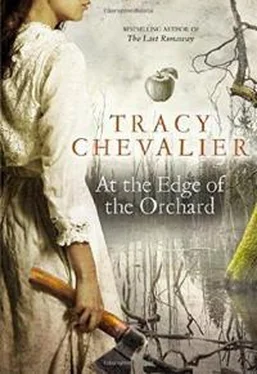


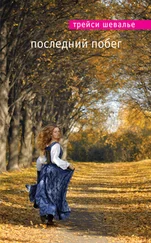

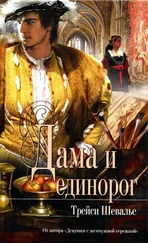
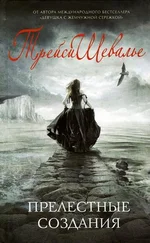
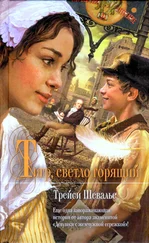
![Трейси Шевалье - Тонкая нить [Литрес]](/books/386177/trejsi-shevale-tonkaya-nit-litres-thumb.webp)
